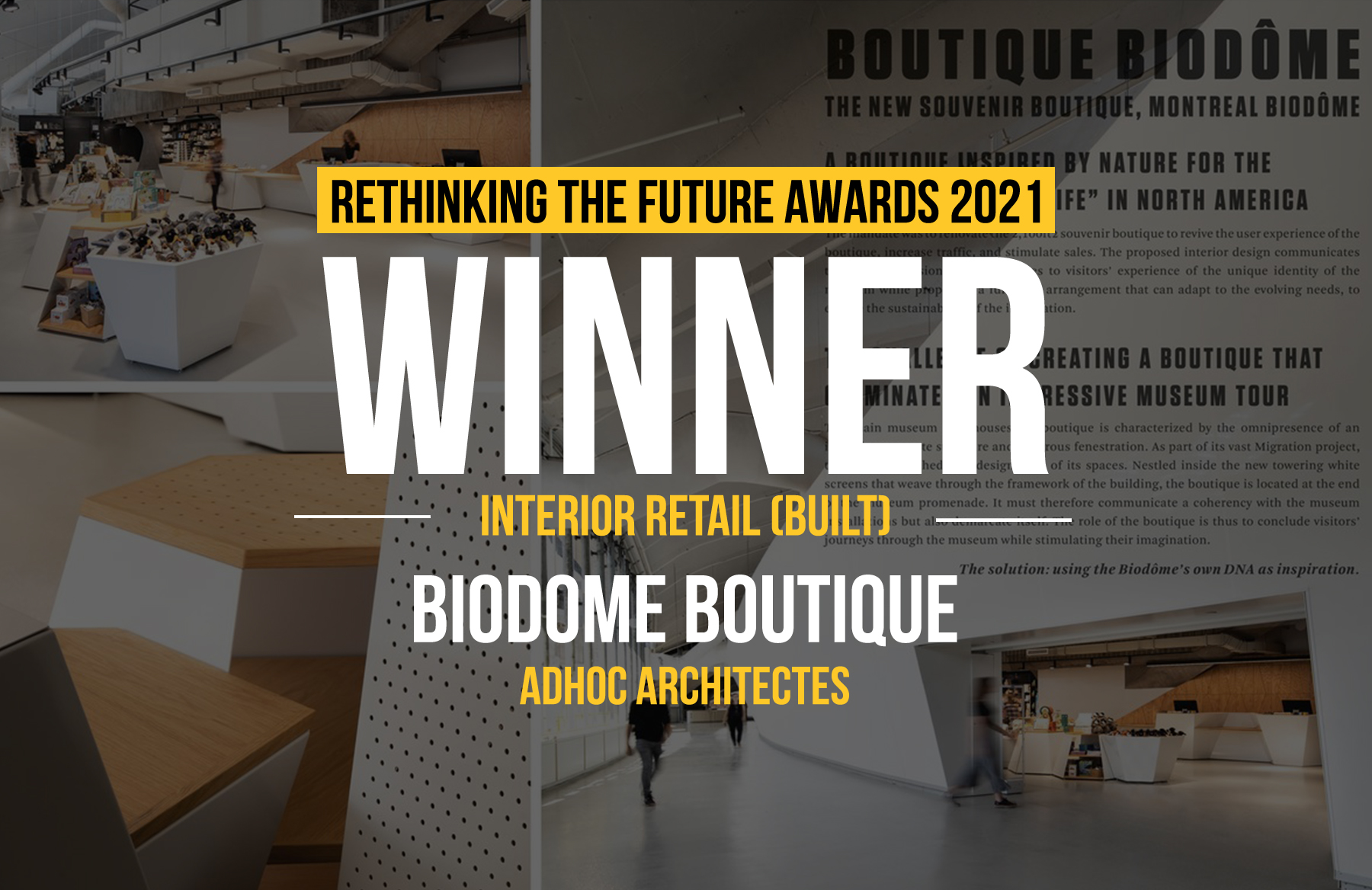THE BIODÔME BOUTIQUE
The new souvenir boutique of the Montreal Biodôme
The Biôdome boutique is an interior design project of modular furniture and storage units for the gift shop space of the recently renovated Montreal Biôdome. Conceived from a consortium between ADHOC architectes and Messier Designers, the mandate was to renovate the 2 100 ft2 boutique to revive the experience of the space and stimulate sales.
Rethinking The Future Awards 2021
First Award | Retail (Interior) (Built)
Project Name: The Biodôme Boutique
Studio Name: ADHOC Architectes + MESSIER designers
Design Team:
Jean-François St-Onge: Arhitect, Artistic director (ADHOC Architectes)
Anik Malderis: Architect, Project manager (ADHOC Architectes)
Maryse Allard: Architectural designer (ADHOC Architectes)
Patrick Messier: Artistic director and industrial design (Messier designers)
Vincent Cloutier: Project manager and industrial design (Messier designers)
Éric Beauchemin: Preliminary industrial design (Messier designers)
Area: 2 100 ft2
Year: July, 2020
Location: 4777 Avenue Pierre de Coubertin Montreal, QC, Canada
Consultants:
Project manager: Gestion BGC
Metal furniture fabricator: Métal CN
Photography Credits: Raphaël Thibodeau
Other Credits:
Client: Ville de Montréal, Espace pour la vie
Nestled inside the new towering white screens that weave through the framework of the building, the Biôdome boutique is located at the end of the museum promenade.
The organizational concept was strongly influenced by nature, which in turn allowed for a degree of evolution in the design capable of adapting to and anticipating changing needs. Inspired by structure and organization in nature, this project was modeled on the shape of a cell, the fundamental unit of structure in all biology capable of autonomous reproduction. The Biôdome being the ‘House of life’, it was fitting for us to draw a formal parallel between the natural cell and the module. After exhaustive research on natural forms, cellular organization and subsequent geometric exploration, the hexagonal frustum was determined to be the most optimal and versatile shape for this project’s particular needs. Several natural phenomena at different scales provided formal inspiration, including basaltic rock formation and beehives. This research enabled the team to develop a narrative structure unique to the Biodôme boutique.
The design approach rests thus on the creation of simple elements (the cells) that can be spatially arranged and connected to construct complex modules. These modules, once combined, respond to the operational and functional need of showcasing products and defining space. Like a living organism capable of adapting and responding to its environment, this “living” boutique will evolve with the ebb and flow of the seasons and years. As the products change to adapt to the demand of the clientele, so too can the modular arrangement. There are four base modules designed to respond to varying product showcasing needs to which accessories can be added. This concept allows for almost infinite composition and reconfiguration possibilities.
Each base module has its own size and specific tint of white. These whites were carefully selected to break the uniformity of industrial profuction, and to express the colour variations found in geological and natural formations. The main material used for the fabrication of the modules is lazer-cut, folded and welded steel covered with a heavy-duty baked-on polymer paint. Oak was favoured for the wooden elements. These materials were chosen for their exceptional durability and reduced environemntal footprint.
The space is minimalist in order to emphasize products and ensure smooth customer circulation. The furniture can accomodate toys, plush toys, jewelry, sweets, books and clothing, which have been carefully selected by the Biodôme team. In the spirit of the Biôdome’s project Migration, which highlights the notions of movement and perpetual change, the boutique embodies the continuance of the experience of the Biôdome, and perpetuates it beyond the context of the museum.
